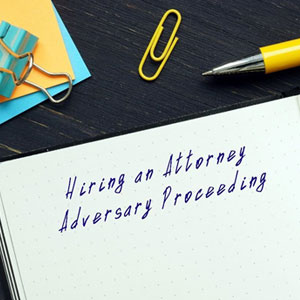 In this article, you can discover:
In this article, you can discover:
- How a debtor can appeal a decision made in an adversary proceeding in bankruptcy.
- The differences between Chapter 7 and Chapter 13 bankruptcy in the context of adversary proceedings.
- The impact of an automatic stay and bankruptcy discharge on adversary proceedings in bankruptcy.
Can A Debtor Appeal A Decision Made In An Adversary Proceeding In Bankruptcy?
Yes, just like any other bankruptcy matter, a debtor can appeal the decision. The initial appeal would be to the district court where the bankruptcy court is located. For instance, in Birmingham, in the Northern District of Alabama, the appeal from the bankruptcy court would be to the district court for the Northern District of Alabama. From there, it would move to the 11th Circuit Court of Appeals based in Atlanta.
What Are The Differences Between A Chapter 7 And A Chapter 13 Bankruptcy In Terms Of Adversary Proceedings?
The differences between Chapter 7 and Chapter 13 in terms of adversary proceedings are minimal. Regardless of whether you are filing an adversary proceeding under Chapter 7 or 13 seeking non-dischargeability, the process is largely the same. However, one difference may exist: in Chapter 7, it might be the trustee who files certain adversary proceedings, while in Chapter 13, the debtor may file due to the different role of the trustee.
What Happens To The Bankruptcy Case During An Adversary Proceeding?
During an adversary proceeding, the bankruptcy case continues to move forward. However, if the adversary proceeding affects certain debts, it may influence the plan, affect payment to creditors in Chapter 7, or impact the feasibility of a plan in either Chapter 13 or Chapter 11.
How Does The Automatic Stay Impact The Adversary Proceeding In Bankruptcy?
The automatic stay is a significant reason why adversary proceedings exist in the first place. It halts any ongoing litigation involving a claim against the debtor or the debtor’s assets. To bypass the automatic stay, some creditors either seek permission from the court to exclude the debt, claim, or lawsuit from the automatic stay or file an adversary proceeding in the bankruptcy action to pursue that debt.
Can A Debtor Be Forced To Sell All Assets As A Result Of An Adversary Proceeding In Bankruptcy?
No, an adversary proceeding alone will not require a debtor to sell assets. However, if the proceeding results in non-dischargeability, the debtor may need to sell assets to repay those debts. If the debtor doesn’t sell assets and the debt is non-dischargeable, the creditor may begin foreclosure or levy proceedings to acquire the debtor’s assets.
How Does Bankruptcy Discharge Impact An Adversary Proceeding In Bankruptcy?
It’s actually the other way around: an adversary proceeding can significantly impact a bankruptcy discharge. For example, under section 523, a creditor may attempt to have its debt excluded from the discharge. If successful, that particular creditor’s debt will not be discharged in bankruptcy, and the creditor will be able to collect its debt from the debtor.
Can An Adversary Proceeding In Bankruptcy Be Settled Out Of Court?
While the parties involved in an adversary proceeding can negotiate and propose settlement agreements amongst themselves, the settlement must be approved by the bankruptcy court. Therefore, while negotiation and settlement discussions occur outside the court, the final approval of any reached agreement is in the hands of the bankruptcy court.
For more information on Appealing An Adversary Proceeding Decision, an initial consultation is your next best step. Get the information and legal answers you are seeking by calling (205) 506-3354 today.

Call Us Now For A Personalized Case Evaluation
(205) 506-3354

